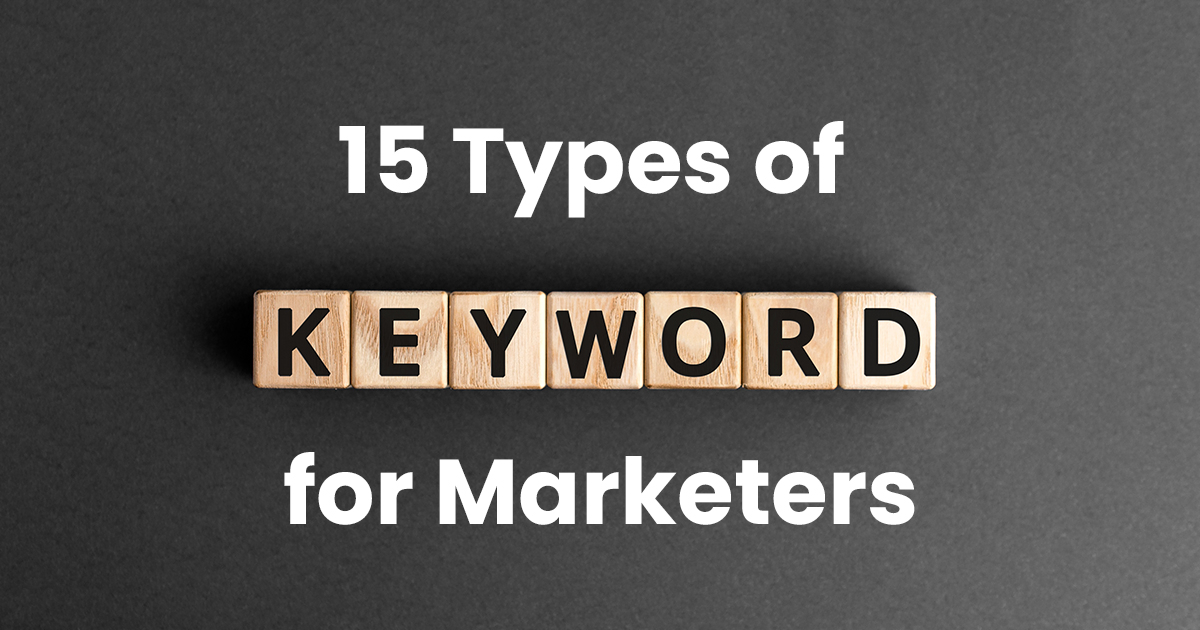Before Knowing what are the different types of keywords? let’s check some facts.
Every second, 90,000 searches are performed on Google in the year 2022.
Knowing what people search for is essential for any business to feature on that coveted first page of search results.
These terms that bring a page to the first page are known as “keywords”, and several types of keywords do the trick.
For example, images play a key role in searches. In fact, 97% of page-one results on Google have at least one image.
Keywords are the most important factors that determine the ranking a page will get according to Google’s search engine algorithm.
They are the first step to successful Search Engine Optimization (SEO).
Once a successful SEO has been implemented, your business is ready to generate organic views.
Search engines undoubtedly play a key role in generating views – the statistics suggest that 39% of all eCommerce traffic is generated from searches.
Thus, no business or website can ignore the importance of a well-thought-out SEO anymore.
What are keywords?
Keywords are the terms that people use to search for information on the internet. When you are creating content, it is important to consider what keywords your audience might be using to find your content.
There are different types of keywords that you can use to target your audience.
In addition, different types of keywords in JAVA or in C languages are also used.
Keywords in JAVA are used for the purpose of identification of class, method, interface, variables, and so on.
On the other hand, C language keywords are used for the purpose of identification of storage classes, data types, functions,s, etc.
However, in this post, we’ll cover different types of keywords in digital marketing or SEO keywords only.
Role of an SEO Keyword:
The role of keywords has changed over the years as Google’s algorithm has become more sophisticated.
In the early days of SEO, keywords were the primary factor in getting your website to rank higher in search engine results pages (SERPs).
Now, while keywords are still important, they are just one part of a comprehensive SEO strategy.
In order to rank higher in SERPs, your website must also have high-quality content, a good user experience, and be optimized for mobile devices.
That said, keywords are still an important part of SEO and should be given careful consideration when you are creating content.
Types of Keywords in SEO
| Sr. No. | Types of Keywords |
|---|---|
| 1. | Short-Tail Keywords |
| 2. | Mid-Tail keywords |
| 3. | Long-Tail Keywords |
| 4. | Long-Term Evergreen keywords |
| 5. | Short-Term Fresh Keywords |
| 6. | Customer Defining Keywords |
| 7. | Geo-targeting Keywords |
| 8. | Intent Targeting Keywords |
| 9. | Competitor Keywords |
| 10. | LSI Keywords |
| 11. | Phrase Match Keywords |
| 12. | Exact Match Keywords |
| 13. | Negative Keywords |
| 14. | Product Keywords |
| 15. | Related Vertical Keywords |
Different keywords are marketed toward different kinds of audiences at various stages of the funnel.
This ensures that a broader audience is reached and also secures a better chance of landing a client or customer.
Some keywords can be directly incorporated into the content based on their intent.
But other types of keywords need to be slowly inserted into a broader category, within multiple sets and subsets of keywords.
Defining your keywords by type helps identify the kind of audience you are feeding.
Because different types of keywords target different communities online, it is easy to determine what type of viewers are taking more interest in your business.
So here is a brief intro to the different types of keywords SEO you may come across while designing your SEO.
Download Detailed Brochure and Get Complimentary access to Live Online Demo Class with Industry Expert.
1. Short-Tail Keywords
Short tail keywords are broad phrases people commonly use in their searches. These usually consist of one or two words.
Their length makes them less specific search terms. However, this type of keyword is relatively standard.
For example, when we search “Cat” or “White flower”, these are considered short tail keywords.
Individual short-tailed keywords are searched more often than any others, but usually, it is the more specific searches that generate the majority of the search volume.
The top 1,000 keywords make up for less than 20% of the search traffic.
However, in online advertising, short-tail keywords are bid on more aggressively than specific search terms. These types of keywords are generic and competitive in nature.
2. Mid-Tail Keywords
The mid-tail keywords are a compromise and try to balance between the high-ranking short-tail keywords and the traffic-generating long-tail keywords.
For example, if a short-tail keyword is “bread” and the long-tail keyword is “buy bread in Connecticut”, the mid-tail keyword will simply be “buy bread”.
Usually, these keywords are aimed at those who are looking for information but aren’t quite ready to follow through with the search results.
These types of keywords are less competitive in nature compared to short-tail keywords
3. Long-Tail Keywords
LongTail keywords are more specific, and thus, less common than the short or mid-tail ones.
Most blogs and websites have a main topic known as the head term.
Usually, this term is used to generate a specific, long-winded keyword as per the search intent of audiences.
As these types of keywords focus on a niche, the conversion rate is very high.
Although they might get a lot fewer search hits, most people who are looking for such specific terms have already made up their minds about needing to make the transaction.
As a result, long tail keywords are excellent SEO tactics and when designed properly, almost guarantee an audience.
These types of keywords have detailed queries and user search with high intent that’s why the audience is guaranteed when using these keywords effectively.
Here are some examples of Long-Tail Keywords:
- “Free online coding classes for kids”
- “Tips for staying motivated while studying at home”
- “Easy science experiments for elementary school students”
4. Long-Term Evergreen Keywords

“Evergreen” simply means something that is long-term and sustainable. Content that doesn’t become irrelevant with time is known as evergreen content.
Similarly, keywords related to such content are known as evergreen keywords.
For example, an article on “10 DIY Ways To Make Your Own Soap” will not become obsolete anytime in the foreseeable future.
And thus, the keyword “Make DIY Soaps” will not become obsolete either.
Evergreen content is a good strategy when it comes to content marketing.
Basing the content on evergreen keywords that rank well ensures that your website remains relevant for a very long time.
The longevity of these types of keywords is long-lasting as compared to other types of keywords.
Here are some more examples of Long-Term Evergreen Keywords:
- “How to lose weight”
- “Best ways to improve your credit score”
- “Tips for reducing stress and anxiety”
5. Short-Term Fresh Keywords
Short-term fresh keywords are those that have been in the news or been hyped over social media very recently.
Writing content on the film or any content related to it would have ensured a steady flow of traffic for some time.
Such types of keywords can be used to gather an explosive amount of search conversions within a very short span, but they fall even more rapidly once the hype dies down.
It is expendable content, written with an expiration date in mind.
These types of keywords have less longevity because they may be booming for some time but can fall down rapidly.
Here are some more examples of Short-Term Fresh Keywords:
- 2023 fashion trends for women”
- “Best new restaurants in Los Angeles”
- “Upcoming concerts in New York City”
6. Customer Defining Keywords
Every business has a target audience and a good business always knows its customer types.
Customer-defining keywords are the types of keywords that define your customers or at least identify how your customers define themselves.
For example, an art gallery would use terms like “artist” or “art connoisseur” as a keyword as that most aptly describes people who will be interested in their business.
SEO isn’t just about featuring in searches. It also includes defining your customers and thus targeting the right people.
Only by understanding this can one build a business that answers the needs of the customers rather than trying to find a customer who may or may not need your services.
7. Geo-Targeting Keywords

As the name suggests, these are words that focus on a particular location.
These types of keywords lead to results that are localized, leading to local businesses and local content.
Localized searches are gaining momentum every day, and even Google is throwing more weight at such searches.
Most websites happen to have a local flavor to them.
And almost all businesses are localized to an extent – geo-targeted keywords are just feeding the current need.
8. Intent Targeting Keywords
Keywords specifically designed to match the intent of the user when searching a particular phrase are known as intent-targeting keywords.
In fact, intent keywords are the most vital aspect of paid search.
By leveraging data recovered from researching intent-driven marketing, advertisers increase traffic to their sites, attract better prospective clients, and can generate more leads.
There are a few types of keywords or search queries – navigational, informational, and transactional.
Usually, the idea behind these types of keywords is to take the transactional queries and generate as many leads from them as possible.
As the name suggests, competitor keywords are the keywords your competing companies use to achieve search listings.
This type of keyword uncovers the words and phrases that drive traffic to your competitor’s website.
This helps you understand your audience’s true interests and generate content accordingly.
There are a few tools one might use to discover such keywords. Some of these are Buzzsumo, SEM Rush, SpyFu, Ahref’s Keyword explorer, AdWords’ Action insight, etc.
Whatever the tool, it is wise to remember that even your fiercest competition can be a valuable teacher, and it is best to try and learn as much as you can from them.

9. Competitor Keywords
As the name suggests, competitor keywords are the keywords your competing companies use to achieve search listings.
This type of keyword uncovers the words and phrases that drive traffic to your competitor’s website.
This helps you understand your audience’s true interests and generate content accordingly.
There are a few tools one might use to discover such keywords. Some of these are Buzzsumo, SEM Rush, SpyFu, Ahref’s Keyword explorer, AdWords’ Action insight, etc.
Whatever the tool, it is wise to remember that even your fiercest competition can be a valuable teacher, and it is best to try and learn as much as you can from them.
10. LSI Keywords
LSI stands for Latent Semantic Indexing. These are conceptual terms that search engines use to understand the content of any website at a deeper level.
For example, if I wrote an article about “Eggs Benedict” and failed to mention the word “food” anywhere, Google is still capable of identifying the page content as food-related.
In the earlier days, search engines used to categorize and identify pages based 100% on the keywords mentioned on the page.
With the advance in language processing, that is no longer the case.
Google now relies on LSI keywords to figure out the overall topic of the page and feature it, accordingly, in its results.
11. Phrase Match Keywords
Simply put, phrase-match looks for exact matches within the search parameter to trigger an ad.
When you open a website after having searched for “Beauticians who do hair as well as makeup” and an ad pops up showing makeup products, it is a phrasal match that is happening in the background.
These types of keywords often contain several variations to account for misspellings, implied terms, synonyms, paraphrases, etc.
Word order is, however, still important, even if words in between are omitted.
12. Exact Match Keywords
These types of keywords are related to short-tail keywords.
An exact match is often used to target advertisers whose ads open up only when a user searches for an exact phrase.
Advertisers bid on these words and engines such as Google and Bing use these to target audiences with certain ads.
With exact-match keywords, a business can target audiences who search for an exact term or a close variation.
This increases the chances of a conversion tenfold. Usually, these are a part of paid services such as Google AdSense.
13. Negative Keywords
Negative keywords can be termed as completely opposite of a phrase match.
They prevent your ad from popping up when a particular keyword is used within the search parameters. It is also known as a “negative match”.
An example Google itself uses is when someone uses “free” as a negative keyword, then any search made using the word “free” will not show your business as a result.
Even when putting your ad on a page, Google is less likely to put it on a page containing such keywords.
These types of keywords should be used carefully else our targeted keywords won’t trigger the searches if negative keywords are wrongly used.
14. Product Keywords
Product keywords are terms related to certain specific products and brand offerings. For example, when we search for “copier”, more often than not we are greeted with products by “Xerox”.
Or if we are to search for tea, we are most likely to find the most popular brand of tea in a location on the very first page.
Very popular companies that leverage these types of keywords include sports companies with tie-ups with sportspersons and sporting events.
Someone searching for Serena Williams is very likely to come across products by Nike on the very first page.
This is because she is a brand ambassador of the company, and thus her name serves as a keyword in this case.

15. Related Vertical Keywords
Vertical keywords are those that offer a more in-depth look into the content of your business. For example, say your business sells computer hardware.
In that case, your horizontal keyword can be “computer hardware seller”, and your related vertical keywords can be either “RAM for sale” or “selling printers”.
In addition to these, generic keywords, informational keywords, navigational keywords, transactional keywords, customer-defining keywords, broad match keywords, branded keywords, etc are some other keyword types that help in optimizing results as per user intent.
Types of Keywords in AdWords
Keyword match types determine the words that will trigger your ad. There are 4 different types of keywords in Google ads based on the match types in AdWords.
- Broad Match
- Broad Match Modifier
- Phrase-Match
- Exact Match
We have already learned about phrase match and exact match. Let us take a quick look at how many keywords are in google ads-.
Broad Match
A broad match allows a business to reach the widest possible audience. When keywords are put under the broad match category, your ad appears whenever a search query contains any part of your keyword.
For example, if your keyword is “women’s hats” and someone searches for “hats”, “men’s hats” or “crazy hats”, it will still appear; but clearly, it won’t convert to a business transaction.
Broad Match Modifier
A broad match modifier allows the user the reach a broad match but allows restrictions around specific queries that will trigger the ad.
Using the modifier ‘+’ and by adding it in front of the keyword, for example, “+women’s hats”, one can ensure that the only searches that will trigger your ad have the complete phrase “women’s hats”.
How to find the right types of keywords?
To find the right keywords for your website, you can start by brainstorming a list of relevant terms to your business or topic.
Once you have a list of potential keywords, you can use a keyword research tool like Google AdWords Keyword Planner to get more information about the search volume and competition for those keywords.
Once you have a list of keywords you want to target, you can start incorporating them into your website’s content.
Use the keywords naturally, and don’t stuff them into your content.
This will not only make your content more difficult to read, but it will also hurt your SEO.
Some of the easy steps you need to follow to find the right keywords for you are-
- Make a list of all potential keywords– First, you need to list all the potential keywords that are relevant to your business. You can use Google AdWords Keyword Planner for this purpose as it will give you an idea about the average monthly searches for a particular keyword and how much competition there is for that keyword.
- Identify your target audience– You need to identify your target audience before you start looking for keywords. This will help you determine the needs and wants of your target audience and make it easier for you to find keywords that are relevant to them.
- Use keyword research tools– There are a number of keyword research tools that you can use to find the right keywords for your business. Some popular keyword research tools include Google AdWords Keyword Planner, Moz Keyword Explorer, and WordStream’s Free Keyword Tool.
- Analyze the competition– Once you have a list of potential keywords, you need to analyze the competition for each keyword. This will help you determine which keywords are more likely to bring you traffic and which ones are more difficult to rank for.
- Select the right keywords– After you have analyzed the competition for each keyword, you can select the right keywords for your business. Make sure to choose keywords that are relevant to your business and that you have a realistic chance of ranking for.
- Implement the keywords– Once you have selected the right keywords, you need to implement them into your website’s content. Use the keywords naturally, and don’t stuff them into your content. This will not only make your content more difficult to read, but it will also hurt your SEO.
- Monitor your results-After you have implemented the keywords into your website’s content, you need to monitor your results to see if the keywords are helping you rank higher in SERPs. You can use a tool like Google Analytics to track your website’s traffic and see how people find your site.
If you are not getting the results that you want, you may need to adjust your keywords.
You can add new keywords, remove keywords that are not performing well, or change the way you are using the keywords on your site.
Keyword research is an ongoing process. You should regularly repeat the above steps to find new keywords you can target.
This will help you keep your website’s content fresh and relevant and help you attract new visitors to your site.
Tools to help in Keyword Research
- Google AdWords Keyword Planner: Google AdWords Keyword Planner is a free tool that allows you to research keywords and get information about the average monthly searches for a particular keyword and how much competition there is for that keyword.
- Moz Keyword Explorer: You can use Moz Keyword Explorer to research and analyze keywords. This tool provides information about keyword difficulty, search volume, and more.
- WordStream’s Free Keyword Tool: WordStream’s Free Keyword Tool is a great way to find new keywords and get information about keyword difficulty, search volume, and more.
- Google Analytics: Google Analytics is a free tool that allows you to track your website’s traffic and see how people are finding your site. This can help determine if your keywords are working.
Conclusion
Keywords are the linchpin between the searches made by prospective customers and the content you provide to meet those needs.
They are vital to any business or website looking to connect over the world wide web. 93% of all online experiences begin with searches.
67% of all people only check the first 5 listings. Thus, understanding the type of keywords and how they powerfully place your page on the top of a search list becomes vital as algorithms evolve.
Only with the proper understanding of SEO mechanisms can one succeed in today’s internet world.
To understand how Digital Marketing can help you grow, enroll in our Certified Digital Marketing Master Course.
Download Detailed Brochure and Get Complimentary access to Live Online Demo Class with Industry Expert.
FAQs
1. What is keyword research?
Keyword research is the process of finding the right keywords for your website. This includes finding keywords relevant to your business that you have a realistic chance of ranking for.
2. What are the types of keywords in SEO?
There are a few types of keywords in SEO:
- Short tail keywords: These are 1-2 word phrases with high search volume but are also very competitive.
- Long-tail keywords: These are 3+ word phrases with lower search volume but less competitive.
- LSI keywords are semantically related keywords that can help you rank for your main keyword.
- Geographic keywords: These are keywords that contain a location, such as “plumber in Seattle.”
- Brand keywords: These are keywords that contain your brand name or a similar variant.
3. How do I choose the right keywords?
To choose the right keywords, you need to analyze the competition for each keyword and select keywords that are relevant to your business and that you have a realistic chance of ranking for.
You can use a tool like Google AdWords Keyword Planner to research keywords and get information about the average monthly searches for a particular keyword and how much competition there is for that keyword.
4. How many types of keywords are there?
There are many types of keywords, but we can classify all of them into 4 main categories based on the search intent of the user:
- Navigational
- Commercial
- Transactional
- Informational
5. What are the 3 types of keywords in Google ads based on match types?
There are 3 Types of Keywords based on match types –
- Exact Match type Keywords
- Phrase Match type Keywords
- Broad Match type Keywords



















Hello, Alesha
I would like to say thank you for sharing this Informative article with us, this is a great article about keyword research. Keyword research is one of the most Important factor of SEO.